
Gilbert Doctorow, Ph.D.
Gilbert Doctorow is the European Coordinator of The American Committee for East West Accord Ltd. and a Senior Research Fellow of the American University in Moscow. His latest book, Does Russia Have a Future? was published in August 2015.
The U.S. view of Russian media is that it is all propaganda all the time to keep the Russian people in line, but it actually encourages diverse and even hostile opinions, says Gilbert Doctorow.
Anyone looking into Russian television programming on both state-owned and privately owned federal channels cannot ignore the heavy presence of political talk shows. They enjoy time on air comparable with formal news broadcasting. Indeed some are wrapped around news bulletins, and all make use of audio-visuals taken from the newsroom to drive the panelists’ debates.
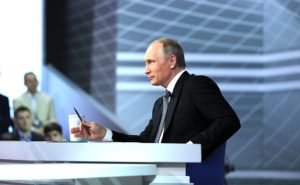
Russian President Vladimir Putin answering questions from Russian citizens at his annual Q&A event on April 14, 2016. (Russian government photo)
The genre of political talk shows is as much a fixture of Russian television around the clock as the daily serials dealing with romance, detective stories and adventure. They tell you that the Russian public, young and old, female and male, is very politicized and keen to hear political views that are divergent from what state news program hosts are reading off their teleprompters. If I had to find a comparable interest in politics in Western Europe, I would name France. I suspect that the U.S. public trails far behind.
But does Russian television present the views of the political opposition to viewers? Does the Kremlin tightly control Russian television for political content? Is Russian mass media monolithic or pluralistic? Are the talk shows journalism or state propaganda?
This review is based on my own participation in nearly all the political talk shows on the Russian national channels from May 2016 through this month. I stress the importance of personal participation because of what I learned about the culture of these shows, about the presenters and producers from chats in the holding pens before and in the refreshments rooms after the shows, as well as from talking to other panelists during the breaks. This is something you cannot get from watching the shows either in live broadcasts or on the Internet postings afterwards (nearly all shows appear on the channels’ websites or on youtube.com). Moreover, only by being present on set can you appreciate how the debates are cut in the editing room before they are broadcast in the case of those shows not going out "live” or before posting on the Internet.
The political talk shows in which I participated are as follows and — except as noted — all have their broadcast headquarters in Moscow:
Rossiya-1 (state-owned): 60 Minutes; Sunday Evening with Vladimir Soloviev
Pervy Kanal (state-owned): Time Will Tell
NTV (privately owned): Meeting Place
Zvezda (federal channel of the Russian Armed Forces): Special Article
Pyaty Kanal (state-owned, St Petersburg based channel 5): Open Studio
Pecking Order
In terms of intellectual level of discourse, the Vladimir Soloviev programs are Russia’s finest. They operate in several formats besides the one mentioned above. One of the most interesting is what is called "Duels” between exponents of two adversarial positions with breaks for coaching by their respective teams and call-in voting to tabulate who has been more persuasive.
While numbers of viewers or ratings are not available and may in fact not be greater than for other programs on the same channel or than talk shows on Pervy Kanal, the numbers of viewers tracked by Youtube.com for the Sunday Evening with Vladimir Soloviev shows often come to 250,000 within 12 hours of posting. Given the demands of such shows on audience knowledge and interest, that is a very impressive showing.
It bears mention that the quality of Soloviev’s program is directly related to the level of the guests he attracts. They are chairpersons of the Duma or Federation Council committees, presidents of the Duma parties, and the very best academic minds. The quality also may be attributed to the freedom the moderator enjoys both for his professional standing and as a Kremlin loyalist. He appears to be very much his own man and interacts freely with his panelists. All of this raises the entertainment value as well as the journalistic content.
I would set this in direct contrast to another leading daily talk show program on the same Rossiya-1, 60 Minutes, where the presenters Yevgeny Popov and his wife Olga Skabeyeva appear to be working strictly from the texts on their teleprompters and instructions given by their managers-producers coming through their ear plugs. The result is loss of spontaneity and authenticity.
In terms of national attention, I would place the Time Will Tell show of Pervy Kanal on a level at or above 60 Minutes. Being an afternoon program with audience of pensioners, it does not draw in first-quality analysts or politicians, although rank-and-file Duma members are frequent visitors. Its outstanding feature is the relative freedom of action of the moderators. Its drawback is the excessively tight control of panelists’ access to microphones, which leads to a great deal of clamor and noise. But the control may be justified by its being the first program to broadcast live to the Moscow time zone, which carries greater political risk than Rossiya-1 shows that broadcast live to the Russian Far East and then are progressively rebroadcast by time zone East to West from recordings to reach Moscow eight hours later.
The commercial station NTV opted for a political talk show modeled on Pervy Kanal’s Time Will Tell, taking over some staff, virtually duplicating the studio and also occupying live broadcast time in mid-afternoon. Its ratings are said to trail substantially the competition, although the lead presenter came to the job with a lot of relevant experience.
The federal channel Five talk show Open Studio operates a split panel sitting in two cities, two in Moscow and four in St. Petersburg, but its home audience is surely in the northern capital. The moderator conducts what might be called sequential interviews with each of the participants, and there is very little cross-talk. One peculiarity of this show is audience call-in of questions.
The Ministry of Defense channel Zvezda has the only talk show that is not broadcast live. From my experience, there was as much shouting on stage as in the noisiest major channel shows, but it was nearly all deleted in the cutting room to yield a smooth flow of debate to the audience. Panelists are taken from a different pool than the major stations, which may be characterized as an advantage, as I will discuss below.
A Constantly Evolving Genre
Russian television programming follows the ratings, because all channels rely on paid commercials, which may take up 12 minutes or more of an hour on air. The hottest competition is between the leading state channels Pervy Kanal and Rossiya-1. They fought tooth and nail to attract audiences to their New Year’s 2017 programming. They fight daily in the talk program genre and ratings swing back and forth depending on the hour of day, topicality of the day’s subject, prestige or charisma of the invited panelists.
When I appeared on Pervy Kanal’s show Time Will Tell dedicated to the U.S. presidential election of Nov. 8, the hosts proudly told me their ratings that day spiked to 20 percent, well above their norm of 15 percent. This means that at the given hours of broadcast in the middle of the afternoon Moscow time 20 percent of all Russian television sets were tuned to the show. By contrast, the leading competitors had ratings of 10 percent or less at that given time.
Because of the fight for ratings and fierce competition, the genre of political talk shows is constantly evolving. The technical sophistication of the studios, the decision to broadcast live (and to which time zones) or to distribute pre-recorded and edited videos, hosting by one, usually male, presenter versus male-female pairs, the level of control of the proceedings before cameras from unseen producers upstairs, the use of evening prime time versus afternoon hours when pensioners and housewives predominate: all of these variables are constantly in play as given shows are enhanced or replaced with each season.
Shouting Matches
It has to be said that Russian political talk shows are meant to be entertaining as well as informative. They are more of a free-for-all than debate governed by Oxford Union type decorum. This reflects the streak in Russian culture that goes in for mixed discipline martial arts contests or single combat "without rules.” It is also calibrated to the time of day and target audience of the given show, as Artyom Sheinin, the moderator of Time Will Tell explained to me when I first appeared there: the show’s afternoon time slot attracts a disproportionately high number of retirees who want an "adrenaline shot” at mid-day. The evening programs on the same Pervy Kanal are less excited, so as not to disturb the digestion of those who just returned home from work and are seated in their armchairs in a reflective mood.
Still, even in the evening slots, most talk shows on both state and private channels put a lot of Russian intellectuals off by their noise. The noise predominates at the middle quality range of the genre. At the ends of the middle spectrum in terms of specifics of the audience (Zvezda with its military families or the more staid and traditional St. Petersburg channel 5, where all panelists have a cultivated demeanor and dress in suits and ties), either the clatter is cut in the editing room, as in the former case, or it does not happen at all because of the prevailing culture, the latter case.
Then there is another and very important exception to the practice of shouting matches, namely the top quality shows, in particular those moderated by Vladimir Soloviev. The very important politicians and political commentators whom he attracts expect and receive their due courtesy and are almost never interrupted.
Subject Matter
The talk shows or show segments in which I and other foreigners participate as panelists debate exclusively issues of international relations, as is entirely logical. If we have any value for the Russian viewers, it is as experts bringing in fresh perspectives and challenging what they otherwise hear from the Russian establishment. On domestic issues, our remarks would not be informed, nor would they be welcomed.
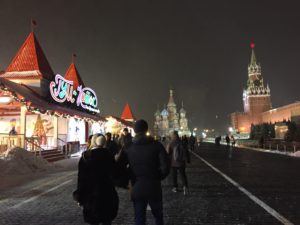
Red Square in Moscow with a winter festival to the left and the Kremlin to the right. (Photo by Robert Parry)
The subject matter on the talk shows closely tracks the topics on Russian news. Over the period of my experience from May 2016 to present, the news has been heavily skewed to Russian relations with Ukraine, military conflict in the Donbas, implementation of the Minsk accords, NATO military exercises near the Russian borders, the NATO battalions arriving in the Baltic States, the Syrian civil war and in particular the liberation of Palmyra and Aleppo, the U.S. presidential campaign, the election results of Nov. 8 and what the new administration of Donald Trump might bring.
On the premier programs of Vladimir Soloviev, international affairs constitute close to 100 percent of the subject matter. However, on other political talk shows, domestic topics in the news may make up between 30 and 50 percent of the programming. Subjects have included the draft law on violence in households, the "Yarovaya” law on electronic surveillance and record keeping, rising monthly fees of apartment owners for building services and repairs, how to deal with the many fatalities caused by joyriding of Russia’s golden youth.
Abstract debates on economic issues or social issues are not in the nature of the talk shows, which are so news-driven that the panelists may be interchanged, even the studio hours may be moved back in order to give the production team time to prepare visuals for a show devoted to some "breaking news.”
Panelist Diversity
The outstanding fact, which is surely the greatest weakness of the genre, is that the pool of panelists from which the major channels draw overlaps excessively. On any given day, you can tune in to several of these talk shows on different channels and find the very same panelists holding forth.
I do not have a firm explanation for this phenomenon. A casual observer might guess that some of the panelists are making their livelihood by multiple appearances, but there is no way of knowing who is being paid to appear. From my chats at the sidelines, I understand that most panelists are being paid nothing other than their taxi fares if they are locals as most are, or flights and hotel if they are out-of-towners. Foreigners are a special case: it is widely assumed that "enemies” are paid for their trouble, meaning in particular panelists coming from Poland and Ukraine.
Factors that I identify to explain the different channels’ drawing on the same pool are availability, known success with the competition and skill of repartee. Appearing on one show draws the attention of the young "producers,” meaning administrators, working at other channels. The job prospects of these handlers rise when they bring in and coach fresh talent. In the case of foreigners, it is fluency in Russian, which must be of rather high standard given the pressures of fast and interrupted debate.
As I have indicated in passing above, some of the best local panelists are Russian legislators from the lower or upper houses of the Federal Assembly. Others are journalists, think tank political scientists, area specialists, military experts. Most have well-established professional careers. A very few are young docents seeking public exposure to gain promotions.
By nationality, the foreigners on talk shows panels come from countries which are in the news and which have tense relations with Russia: Ukrainians, Poles, Baltic States, the U.K. and the U.S. Most, but not all deliver, as expected, harsh critiques of Russian foreign policy. In this respect, Russian television for the domestic audience has a totally different set of requirements and objectives than the channel dedicated to foreign audiences, Russia Today, where foreign guests are often "friends of Russia.”
Among the most experienced foreigners with near native fluency regularly appearing on the Pervy Kanal and Rossiya-1 is the British journalist and lecturer, Owen Matthews, from Newsweek. I joined him at a session of 60 Minutes. Another journalist of major standing with whom I appeared on Time Will Tell is David Filipov, Moscow bureau chief of The Washington Post. It bears mention that, to my knowledge, neither they nor the other Western critics of President Putin who are invited onto Russian talk shows have written anything about their experiences while their readerships are led to believe by the publications they work for that Russian media are just monolithic propaganda outlets for the Kremlin.
Other U.S.-based guests from the think tank world who appear regularly on the premier talk shows of Rossiya-1 are Ariel Cohen from the Atlantic Council and Dimitri Simes, President of the Center for the National Interest. Both are given 5 or 10 minutes to themselves by satellite link from Washington, D.C. Their statements, usually about political developments in the U.S. from the perspective of "inside-the-Beltway,” then are commented upon by the talk show’s in-studio panelists. Cohen is also occasionally in the Moscow studio as a panelist. Both speak native Russian.
Finally, there is the unique phenomenon of all Russian talk shows during the time period under review: the journalist Michael Bohm, who spent a decade as editor of the op-ed page of The Moscow Times and now provides spice to Russian television by energetically defending the views of the neocons and liberal interventionists in their anti-Russian policies. He is the American whom many Russians love to hate. Nonetheless, his mastery of Russian folk sayings has endeared him even to his harshest detractors.
By party affiliation, the Russian politicians appearing on the political talk shows belong predominantly, but not exclusively to the parties in the Duma. Among the most frequent guests on the Soloviev shows are leading members of the ruling United Russia party Vyacheslav Nikonov, chairman of the Duma Committee on Education; Aleksey Pushkov, former chair of the Duma Committee on International Affairs; and his predecessor in this post, Konstantin Kosachev, now chair of the same committee on the Federation Council.
Though less often, the other Duma parties are definitely visible on these shows. Vladimir Soloviev gives frequent invitations to the president of the Liberal Democratic Party of Russia Vladimir Zhirinovsky whose nationalist views he obviously shares. LDPR’s Duma Deputy Leonid Slutsky, the new chair of the Committee on International Relations, was on the talk shows soon after his appointment. Gennady Zyuganov, leader of the Communist Party of the Russian Federation, is invited far less often to the major talk shows and the invitation is usually in connection with commemoration of some event or personality from the Soviet era.
The political talk shows also regularly invite as panelists members of certain parties that were unable to reach the 5 percent voter threshold to win seats in the State Duma. By rule of thumb at Time Will Tell, for example, they constitute 10 percent of the panelists. The parties most commonly invited are Yabloko and Party of Growth.
How Diverse?
So, does Russian television present the views of the Opposition? It all comes down to definitions. What do we mean by the "Opposition”?
For many American experts on Russia, the definition of "opposition” pre-determines the answer to the questions of pluralism, genuine journalism and the like on Russian television. This is because the notion of Russian opposition that has taken hold in the United States is attached to "regime change,” not to normal electoral politics. Only those committed to bringing down the "Putin regime” are deemed worthy of the designation "opposition.”
In this view, all Duma parties other than the ruling United Russia party – namely the Communist Party of the Russian Federation, Just Russia, and the Liberal Democratic Party of Russia – do not count as opposition.
To be sure, nearly all Duma parties rally behind the foreign policy of Vladimir Putin, though several are still more strident nationalists than the ruling United Russia party. However, in matters of domestic policy, the Duma parties have their own policies and strongly criticize the ruling party seeking to modify its legislative initiatives and to introduce bills of their own. To deny them the status of Opposition is like considering the Democrats and Republicans in the U.S. an undifferentiated mass because they largely share a bipartisan foreign policy (at least until the advent of Donald Trump). This point is all the more relevant when we consider that a variable but always substantial portion of most talk show programming is devoted to domestic as opposed to foreign policy issues.
Until his death in 2015, Boris Nemtsov and his Parnas movement were THE OPPOSITION in the eyes of American experts. Nemtsov, Milov and Kasyanov were striking out against the corruption with which the Putin regime was said to rely to stay in power, against its authoritarian if not dictatorial ways, and stood in favor of accommodation with the West, which they claimed was obtainable if only Russia cast aside the aggressive, assertive habits of the Putin regime.
Since Nemtsov’s death, the new White Knight in Russian politics for American observers has been the blogger Alexei Navalny, who showed his political muscle in the last mayoral elections in Moscow. Never mind that Navalny has little electoral support outside the capital or that his political views are ultra-nationalist. He is determined to bring down the regime and that is enough.
From my observations of the period under review, neither representatives of Parnas nor Navalny and similarly minded, self-styled "non-systemic opposition” were ever admitted to any of the television talk shows whatever the channel precisely because of their seditious intent.
But before our American experts exclaim "gotcha” I would ask them whether they can cite an appearance of leaders from Occupy Wall Street on Meet the Press, say in 2009, or at any time since? The American equivalent of "non-systemic opposition” is precisely that kind of folks. No government, including no democratic government, will give such opponents the microphone to foment insurrection on national television, least of all during prime time.
For these reasons, I insist that the question of pluralism and the journalistic mission of informing the audience and bringing to them alternative points of view have to be posed more broadly without reference to specific individuals or parties/movements being given the microphone on air.
Besides the well-known positions of the Yabloko Party leaders who appear in the talk shows among the 10 percent reserved for defenders of the Yeltsin-era accommodation with the West, mention has to be made of Sergei Stankevich, who since 2016 represents the Party of Growth, another non-Duma party. An early ally of Yeltsin who later fell out of favor, spent several years as a political exile in Poland and was later pardoned, Stankevich regularly questions on air the whole logic of Russia’s actions in Crimea and in Ukraine’s Donbas region.
And, if we take a broad view and look to the airing of ideas challenging the official party line of the Kremlin on international affairs, the foreign guests who are always invited onto the panels are a proxy for the views of the anti-Kremlin domestic opposition, including the non-systemic opposition.
At a minimum, the talk shows in which I have participated were staged to present a discussion of topical issues of international relations by skilled and well-informed experts representing diverse points of view. In that sense, they demonstrate pluralism as opposed to Kremlin propaganda. They are guided by a journalistic interest to address current events and to expose the public to various interpretations.


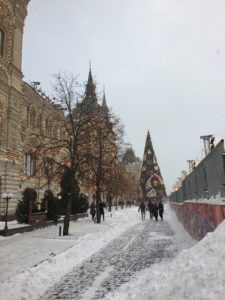
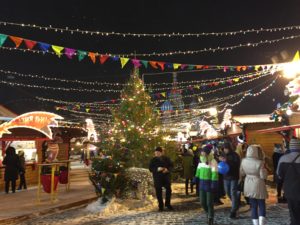
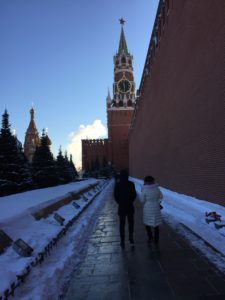

.jpg/250px-ElbeDay1945_(NARA_ww2-121).jpg)





